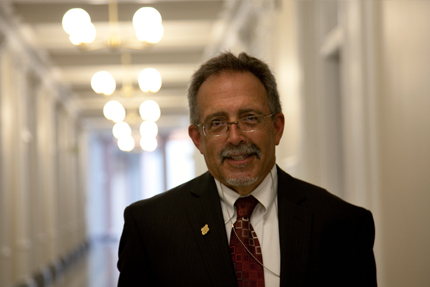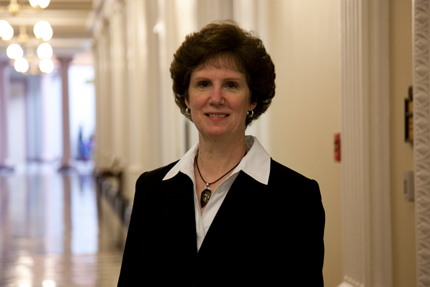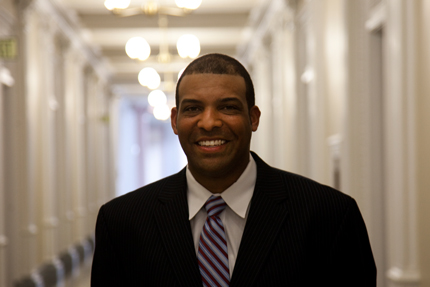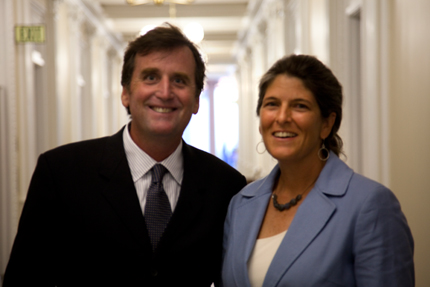Related Rural Blog Posts
Restoring Our Connection to the Land
Posted by on July 20, 2011 at 6:42 PM ESTEd. Note: Champions of Change is a weekly initiative to highlight Americans who are making an impact in their communities and helping our country rise to meet the many challenges of the 21st century.

For every American there can be no greater reward for ones's work then to be asked to come to the White House to share your thoughts. To be included with outstanding representatives from across the country as "Champions of Change" on behalf of rural Americans was truly an honor and a extraordinary example of our system of government at its finest, as well as exemplifying the sincere interest by the Administration to hear from "real people" outside the proverbial "Beltway."
As I looked around the room at the farmers and ranchers who literally had to leave their chores for the day to be in DC, I thought how fortunate we are to still be able to honor the way of life that helped make this country what it is today, and importantly how we can learn from them how to instill those characteristics in future generations of rural Americans.
My work for the last 30 plus years has been of a different, but closely related nature. Connecting Americans and our visitors to the land through tourism and outdoor recreation has been my passion. First as an international tour guide leading camping tours across the country, then serving as President of the American Hiking Society and Co-executive Director of the Continental Divide Trail Alliance with my wife, Paula and then founder of Choose Outdoors, a national nonprofit that seeks to connect all Americans to the land through Outdoor Recreation.
Learn more about RuralRegional Food Systems Create Jobs
Posted by on July 20, 2011 at 5:01 PM ESTEd. Note: Champions of Change is a weekly initiative to highlight Americans who are making an impact in their communities and helping our country rise to meet the many challenges of the 21st century.

I am honored by the White House Champions of Change award. It was a real thrill to sit at the table with the White House Rural Council and eighteen ambitious leaders from across the United States and see the incredible creativity that each one has lent to improving conditions in America. I was especially excited that President Obama joined our meeting and met us individually to get acquainted with each of our efforts.
I shared with President Obama, Secretary Vilsack and the Rural Council some of the significant opportunities our business model represents for promoting economic development, job creation and wealth building in rural communities.
Our Food Enterprise Center is creating amazing opportunities for food entrepreneurs, social investors and space for innovative food businesses to start up and expand with the infrastructure to process, market and distribute locally grown food.
Learn more about RuralTribal Members in Rural America
Posted by on July 20, 2011 at 12:41 PM ESTEd. Note: Champions of Change is a weekly initiative to highlight Americans who are making an impact in their communities and helping our country rise to meet the many challenges of the 21st century.

I recently was invited to the Champions of Change event for rural America. It was great to meet with President Obama and Secretary Vilsack and hear how much they cared about some of the unique issues facing rural America. The President took the time and was gracious enough to introduce himself to everyone at the meeting. All and all, not my typical Wednesday afternoon.
I run a company called Ho-Chunk, Inc. located on an Indian reservation in Winnebago, Nebraska. The company is owned by the Winnebago Tribe of Nebraska and our mission to create job opportunities for our tribal members and to help our tribe become economically self-sufficient. After 15 years of efforts we have companies involved in retail, government contracting, distribution, construction, housing and various internet companies. We do work in three other foreign countries. We started with 1 employee and now have 1400. Our revenues have grown from zero to close to $200 million a year, all in a rural Nebraska town of 1500 people.
In 1991, the tribe had an unemployment rate of approximately 60 percent. Now we have more jobs than working age people in our community. We are proud of our accomplishments economically, but social and educational development are just as important to our tribe. In 2000, Ho-Chunk, Inc. started a non-profit corporation called the Ho-Chunk Community Development Corporation. The non-profit's mission was to help make our community a better place and to provide supplemental capital to build the infrastructure in our community to help it grow. To date, our non-profit has raised over $23 million for our community.
Learn more about RuralSharing Experiences as African-American Farmers
Posted by on July 20, 2011 at 10:13 AM ESTEd. Note: Champions of Change is a weekly initiative to highlight Americans who are making an impact in their communities and helping our country rise to meet the many challenges of the 21st century.

On July 6, 2011, I was recognized as a “Champion of Change" by the Obama Administration. This allowed me the opportunity to have a roundtable discussion with rural leaders from around the country and government officials to discuss the progress happening in rural America.
It was quite an experience to be on my combine harvesting wheat on Tuesday and sitting around a table in the White House with President Obama on Wednesday. I must say, this was an experience for an ol' country boy!
As I sat listening to President Obama, I remembered how as a child I would listen to my grandfather and father talk about their experiences as African-American farmers. Their triumphs and pitfalls inspired me to return to the family farm when I completed my education in Agricultural Economics at Virginia Tech. Now I am able to share my experiences with the next generation through my participation with the National Black Growers Council (NBGC) by advocating to increase the efficiency, sustainability and productivity of black row crop farmers.
Philip Johnson Haynie, III serves on USDA's Plant Variety Protection Act Board and on the Agricultural Advisory Council for Virginia's first congressional district. P.J. is also a member of the National Black Growers Council, a coalition of African American commodity growers who advocate for the 21st century policy needs of Black growers and the future of Black growers.
Learn more about RuralMaking a Difference in Rural Economies with Cooperatives
Posted by on July 20, 2011 at 8:45 AM ESTEd. Note: Champions of Change is a weekly initiative to highlight Americans who are making an impact in their communities and helping our country rise to meet the many challenges of the 21st century.

I was honored to be able to participate in the Champions of Change series at the White House on July 6th. The theme of the week was Rural America and a group of rural leaders from across the country joined in a conversation with Secretary of Agriculture Tom Vilsack and Melody Barnes the head of the White House Domestic Policy Council. We were all pleasantly surprised to have President Obama drop-in for a visit. I was pleased to know that the President takes rural issues so seriously.
As a life-long farmer from western North Dakota, I have found that cooperatives have made a huge difference in our rural economy. I have used cooperatives in my farming business during my whole career. I have served on several cooperative boards and am currently the board chair of CoBank, a cooperative bank serving rural America headquartered in Denver. CoBank as part of the Farm Credit System serves rural America by providing credit and financial services to farmer owned agricultural cooperatives and related businesses, certain farm credit associations, and rural infrastructure businesses including rural electrics, rural communications providers, and rural water and waste water systems. CoBank also provides export financing of agricultural products. The Farm Credit System is a government-sponsored entity and as such has a mission to serve rural America which we take very seriously. CoBank has been active in the renewable fuels sector such as ethanol, solar, and wind.
I’ve always felt that cooperatives are the way for farmers such as me to achieve the scales of economy that allows me to compete in a global market. My farm is served by supply and marketing cooperatives, rural electric and communication cooperatives. I rely on Farm Credit and credit unions for financial needs and even insurance needs are largely through mutual insurance companies.
Learn more about RuralSupport Biomass Crops and Renewable Energy
Posted by on July 19, 2011 at 5:46 PM ESTEd. Note: Champions of Change is a weekly initiative to highlight Americans who are making an impact in their communities and helping our country rise to meet the many challenges of the 21st century.

Last week in our meeting with Secretary Vilsack concerning rural development opportunities it became apparent that our country is facing a critical point. Energy and food production are approaching unprecedented challenges with occurrences such as China, South Korea and Saudi Arabia’s recent purchases and leases of over 140 million acres of land in Ethiopia and Sudan. To put things in perspective, this is the equivalent of all of the U.S.’s wheat and corn land currently in production.
The United States is fortunate enough to have abundant and fertile land and a strong transportation infrastructure. The challenge is to turn our focus to rural America, from which so much of our food and energy come but which has only 16% of our population. Fellow Champions of Change outlined many creative ways of addressing rural America’s needs. Local food movements, energy efficient and consolidated housing development, and energy crops were among some of the many established and on-the-ground examples that are already functioning and put in place by just the few people in the room. All of these examples had something in common, which was the support of the USDA either through outreach or initial funding.
Learn more about Energy and Environment, Rural
- &lsaquo previous
- …
- 21
- 22
- 23
- 24
- 25
- 26
- 27
- 28
- 29
- …
- next &rsaquo